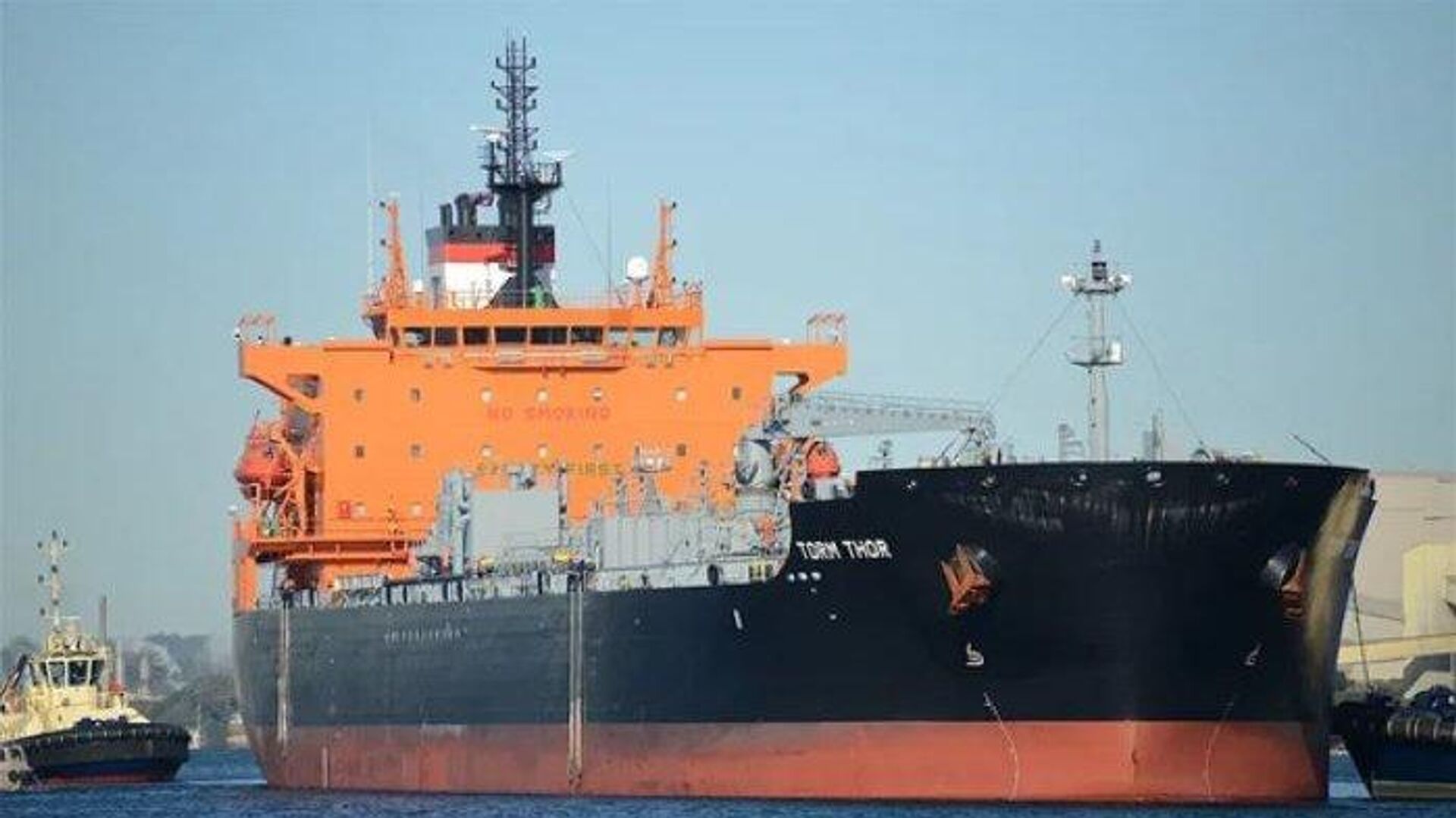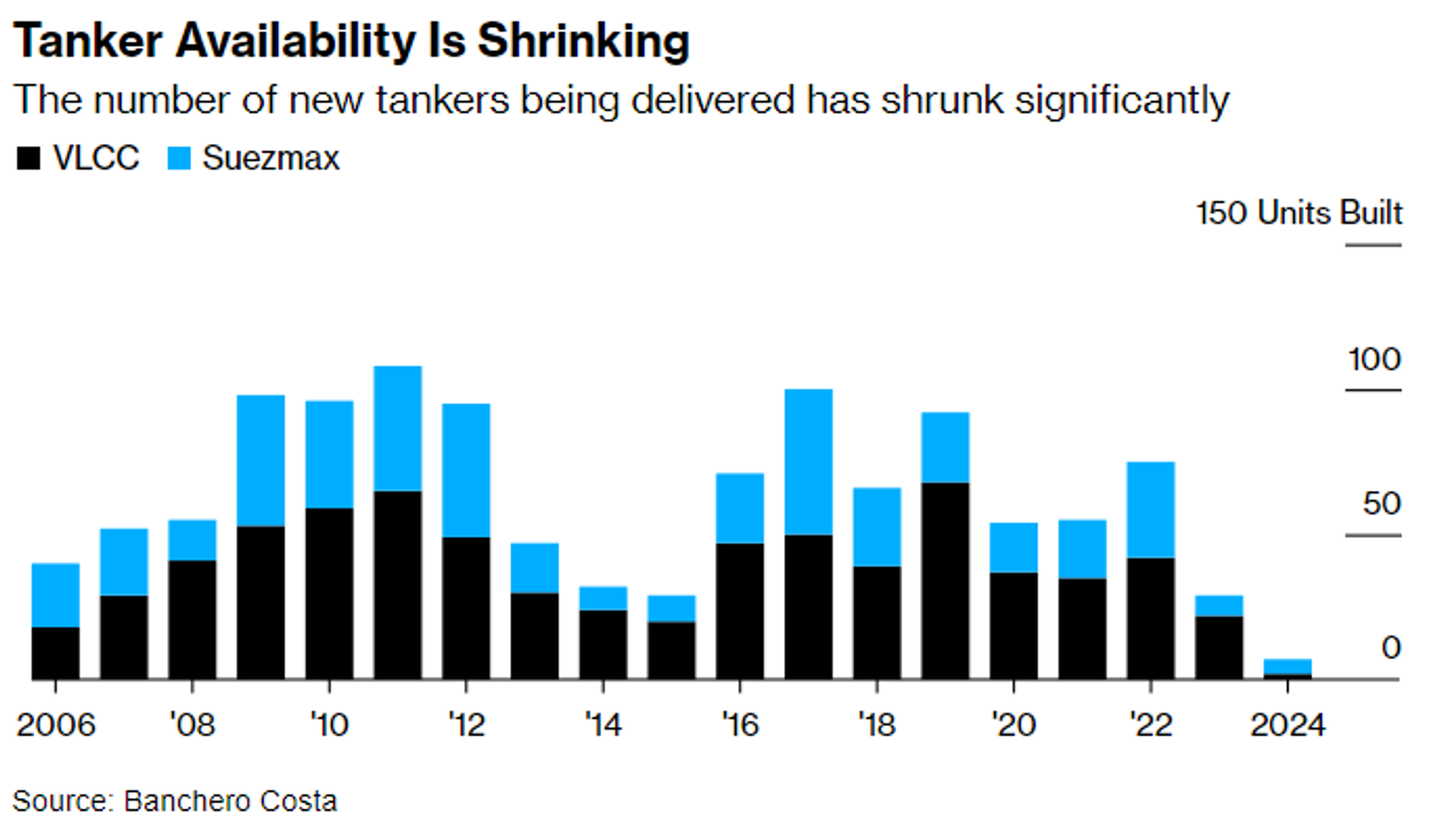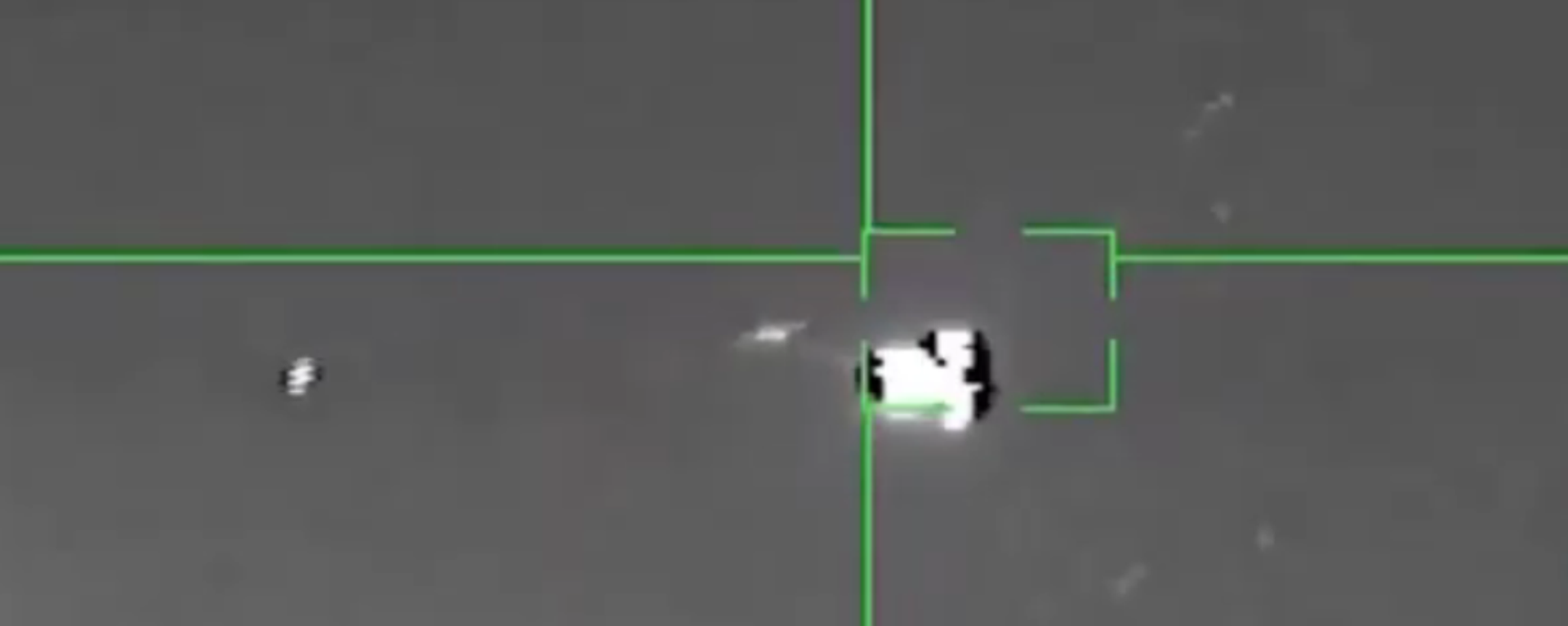https://sputnikglobe.com/20240226/red-sea-crisis-triggers-shortage-of-oil-tankers-1116986040.html
Red Sea Crisis Triggers Shortage of Oil Tankers
Red Sea Crisis Triggers Shortage of Oil Tankers
Sputnik International
Red Sea crisis, Houthi attacks at vessels bound for Israel, triggers shortage of oil tankers.
2024-02-26T08:06+0000
2024-02-26T08:06+0000
2024-02-26T08:06+0000
world
houthi
houthi militants
palestine-israel conflict
gaza strip
israel
red sea
gulf of aden
yemen
houthis
https://cdn1.img.sputnikglobe.com/img/07e8/02/1a/1116985369_0:0:699:393_1920x0_80_0_0_6d6efcabdfe0f2822806fe564d2898b4.jpg
As further proof that the Biden administration's military methods are failing to resolve the ongoing Red Sea crisis, the Houthis targeted yet another tanker in the Gulf of Aden on Saturday with an anti-ship ballistic missile. US Central Command announced on February 25 that the missile struck the water and did not cause damage to chemical and oil products tanker the Torm Thor, flagged and owned by a US company.On the evening of the incident, US Central Command forces also shot down two one-way unmanned aerial vehicles (UAV) over the Red Sea.Yemen's Ansar Allah movement military spokesman Yahya Saree also confirmed that several anti-ship missiles were fired at the US ship Torm Thor in the Gulf of Aden. The incident came as the United States and its allies carried out strikes against Yemen's Houthi movement, hitting 18 military targets, the US Defense Department said on Sunday."Today's necessary and proportionate strikes specifically targeted 18 Houthi targets across 8 locations in Yemen associated with Houthi underground weapons storage facilities, missile storage facilities, one-way attack unmanned aerial systems, air defense systems, radars, and a helicopter," the Defense Department said in a statement. It added that the strikes were conducted by the US, the UK, Australia, Bahrain, Canada, Denmark, the Netherlands, and New Zealand in response to the "Houthis' continued attacks against commercial and naval vessels transiting the Red Sea and surrounding waterways."However, this fresh incident appears to show how ineffective the US-led approach to resolving the situation with the Yemeni militia is. Yemen's Ansar Allah movement refuses to cower in the face of US strikes, and issued a formal notification to shipping and insurance firms of a ban on the passage of Israeli-, United States-, and United Kingdom-affiliated ships through sea routes near Yemen, a source in the movement's leadership told Sputnik.The result is a shipping crisis that has disrupted global supply chains and driven up shipping costs. The Red Sea route typically accounts for 15 percent of total global sea trade. However, in an effort to avoid being targeted by the Houthis, traffic has been forced away from the Suez Canal, connecting the Mediterranean Sea to the Red Sea, and rerouted around the tip of Africa instead. Longer journeys have resulted in costlier trade between Asia and Europe, with warnings of looming inflationary impact in Europe.Now another problem has surfaced impacting global petroleum trade - a shortage of tankers.Commercial container vessels were the first to react to the danger of Houthi attacks and acknowledge the need to shift trade routes. However, after US and UK forces began bombing Yemen in an attempt to quell the Red Sea incidents, many global owners of oil and fuel tankers similarly opted to steer clear of the area. With only two new supertankers expected to join the aging fleet in 2024, as per Banchero Costa shipping services data (the lowest number in close to four decades), a lack of capacity is expected to make itself acutely felt. Only five new supertankers are set to be delivered in 2025 - a noticeable drop from the 42 ships that joined the fleet in 2022.“The situation is tight in the tanker market, in particular for crude oil tankers,” Enrico Paglia, research manager at Banchero Costa, was cited as saying. He added that the situation was expected to grow even more challenging in the future.However, according to recent reports, even Biden administration officials are increasingly questioning the effectiveness of their chosen approach to dealing with the Houthis, who continue their attempt to block the operations of Western commercial and navy ships in the Red Sea.
https://sputnikglobe.com/20240119/do-red-sea-crisis-and-iran-pakistan-spat-stem-from-gaza-war-1116275245.html
https://sputnikglobe.com/20240219/houthis-bring-down-second-us-reaper-drone-as-red-sea-crisis-escalates-1116875086.html
gaza strip
israel
red sea
yemen
Sputnik International
feedback@sputniknews.com
+74956456601
MIA „Rosiya Segodnya“
2024
News
en_EN
Sputnik International
feedback@sputniknews.com
+74956456601
MIA „Rosiya Segodnya“
Sputnik International
feedback@sputniknews.com
+74956456601
MIA „Rosiya Segodnya“
us attacks on houthi, shortage of oil tankers,houthi attacks at vessels bound for israel, us yemen strategy, houthis attacks, us military forces, palestine-israeli conflict,
us attacks on houthi, shortage of oil tankers,houthi attacks at vessels bound for israel, us yemen strategy, houthis attacks, us military forces, palestine-israeli conflict,
Red Sea Crisis Triggers Shortage of Oil Tankers
The Houthi's campaign of targeting commercial Israeli-owned and bound ships traveling through the Red Sea with missiles and drones as well as hijacking them has affected major global shipping giants. Some of them have been forced to halt their operations through the strategic passageway, while shipping insurance rates have soared.
As further proof that the Biden administration's military methods are failing to resolve the ongoing Red Sea crisis, the
Houthis targeted yet another tanker in the Gulf of Aden on Saturday with an anti-ship ballistic missile. US Central Command announced on February 25 that the missile struck the water and did not cause damage to chemical and oil products tanker the Torm Thor, flagged and owned by a US company.
On the evening of the incident, US Central Command forces also shot down two one-way unmanned aerial vehicles (UAV) over the Red Sea.
Yemen's Ansar Allah movement military spokesman Yahya Saree also confirmed that several
anti-ship missiles were fired at the US ship Torm Thor in the Gulf of Aden.
The incident came as the United States and its allies
carried out strikes against Yemen's Houthi movement, hitting 18 military targets, the US Defense Department said on Sunday.
"
Today's necessary and proportionate strikes specifically targeted 18 Houthi targets across 8 locations in Yemen associated with Houthi underground weapons storage facilities, missile storage facilities, one-way attack unmanned aerial systems, air defense systems, radars, and a helicopter," the Defense Department said in a statement. It added that the strikes were conducted by the US, the UK, Australia, Bahrain, Canada, Denmark, the Netherlands, and New Zealand in response to the "Houthis' continued
attacks against commercial and naval vessels transiting the Red Sea and surrounding waterways."
However, this fresh incident appears to show how ineffective the US-led approach to resolving the situation with the Yemeni militia is. Yemen's Ansar Allah movement refuses to cower in the face of US strikes, and issued a formal notification to shipping and insurance firms of a ban on the passage of Israeli-, United States-, and United Kingdom-affiliated ships through sea routes near Yemen, a source in the movement's leadership
told Sputnik.
The result is a shipping crisis that has disrupted global supply chains and driven up shipping costs. The Red Sea route typically accounts for 15 percent of total global sea trade. However, in an effort to avoid being targeted by the Houthis, traffic has been forced away from the Suez Canal, connecting the Mediterranean Sea to the Red Sea, and rerouted around the tip of Africa instead. Longer journeys have resulted in costlier trade between Asia and Europe, with warnings of looming inflationary impact in Europe.
Now another problem has surfaced impacting global petroleum trade - a shortage of tankers.
Commercial container vessels were the first to react to the danger of Houthi attacks and acknowledge the need to shift trade routes. However, after US and UK forces began bombing Yemen in an attempt to quell the Red Sea incidents, many global owners of oil and fuel tankers similarly opted to steer clear of the area.
With only two new supertankers expected to join the aging fleet in 2024, as per Banchero Costa shipping services data (the lowest number in close to four decades), a lack of capacity is expected to make itself acutely felt.
Only five new supertankers are set to be delivered in 2025 - a noticeable drop from the 42 ships that joined the fleet in 2022.
“The situation is tight in the tanker market, in particular for crude oil tankers,” Enrico Paglia, research manager at Banchero Costa, was cited as saying. He added that the situation was expected to grow even more challenging in the future.
The Houthi movement, which controls large parts of northern and western Yemen, vowed in November 2023 to attack any ships associated with Israel until it halts military actions in the Gaza Strip. This led US Secretary of Defense Lloyd Austin to announce the creation of a multinational operation to secure navigation in the Red Sea. US and UK forces later launched major strikes against Houthi positions in a bid to degrade the rebels' ability to target commercial vessels.
However, according to recent reports, even Biden administration officials are
increasingly questioning the effectiveness of their chosen approach to dealing with the Houthis, who continue their attempt to block the operations of Western commercial and navy ships in the Red Sea.







